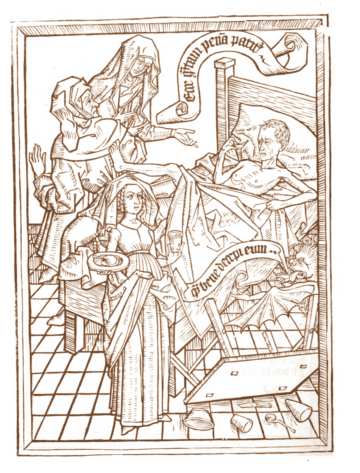Original Ars Moriendi Panel
The fifth ars moriendi panel envisions avarice. That’s a fun word we don’t see as often today. The word means “excessive or insatiable desire for wealth or gain” and in its ars moriendi context the issue was the proclivity to cling to wealthy and possessions rather than let go and find security in a (hopefully) heavenly future.
Modern Context
These days, avarice is still rampant in society. Not that success and wealth are inherently bad, but most can agree toxic levels of greed are definitely not good. In one’s own life, avarice above all can certainly be negative. How many people die wealthy and alone? What good is wealth when you’re dead and gone? Conversely, what good can be done by philanthropists and creators of industry, economies, and communities?
Rather than focusing on the ills of avarice, in this modern ars moriendi how might a refocus on matters of wealth and wisdom be more meaningful? Wisely building success, wealth, and accompanying generosity are arguably a noble pursuit. If avarice is your vice, then that is an issue to address, however with wise planning, a view towards generosity, and heard work, wealth can be a positive force for change in the world while you’re alive and well beyond.

